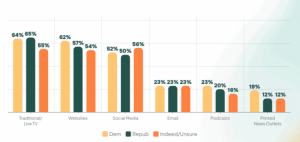Bing’s Christi Olson takes a look at 20 years of search.

We live in a mobile-first, cloud-first world powered by technology that changes by the nanosecond. And search is no different. Search is changing in look, form and function to become part of the fabric of our everyday lives, barely recognizable from its inception as a text box.
By 2020, 50 percent of searches will be voice searches (ComScore). The Amazon Echo, a voice-activated home automation hub, was the top-selling speaker in 2015 (KPCB Internet Trends 2016), getting over 25,000 five-star reviews on Amazon, signaling a real shift in how we conduct searches. As we enter a new era of personalized search, I’d like to take a moment to look back at where we came from. A nod to our past, if you will, as we spiral toward a knowledge-drenched future built upon the very fabric of search.
The early days
I refer to the early days of search as Query Search. Some search pioneers may even remember Archie, considered to be the very first search engine, which launched over 25 years ago. Early query searches had to match the exact wording of a website’s title in order to appear, as search bots only scanned titles. Imagine the frustration of trying to find a website, playing hit or miss across an ocean of content. Engines quickly evolved to index entire pages and return a broader array of results.
Over the years, many different engines appeared, weighing in with various technologies and pushing search forward with faster listings and smarter indexing. And then, in 2000, something very interesting happened. The pay-per-click (PPC) model arrived on the scene. Suddenly, a searcher’s everyday quest for knowledge became an advertising channel the likes of which we’d never seen. Almost overnight, “being found” on the internet turned into a commodity — and a highly valuable one at that. Engines scrambled to fine-tune the PPC model, developing self-service interfaces so that advertisers could manage their own campaigns, and a new field of marketing was born — search.
The 6 eras of search
The last 20 years of search can be broken down into six defining eras: Query, Demographic, Mobile, Voice, Personal and ultimately, Intelligent.
Demographic search quickly grew out of a need to qualify searches, leading to day parting and language targeting to help advertisers zone in on specific markets.
Mobile search started picking up steam in the mid-to-late 2000s, with marketers touting that each subsequent year would be the “year of mobile;” however, the explosion of the mobile era didn’t begin until around 2012, and we’ve now seen mobile outpace desktop search growth. This explosion has led to device bidding and location targeting, with searchers expecting hyper-relevant results based on their location.
And finally, with the advent of natural language searches, the era of voice arrived, and search officially jumped out of the text box and into our lives. Bing currently powers the voices of Cortana (Windows 10), Siri (iOS) and Alexa (Amazon Echo).
This, of course, is only the tip of the iceberg. Search is no longer just about finding information. It’s part of our everyday life, an assumed presence, and there is no going back to life without search. We’re entering an era where search is personal, predictive and actionable. It’s not only on our computers, but it’s on our phones. In our homes. In cars. In gaming systems. We can shop, book travel, make reservations — all directly within the results pages. Search engines are getting more and more intelligent, delivering contextual results based on location, trends and historical data.
So the next time you call out to your Amazon Echo, “Order me a pizza,” take in a brief moment of awe at how far we’ve come so quickly and what amazing things lie ahead.
Check out other great content at Bing.
Marketing Land – Internet Marketing News, Strategies & Tips
(33)






